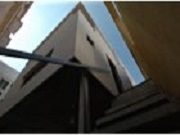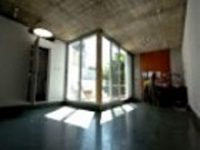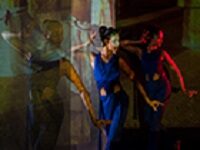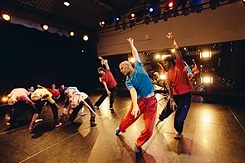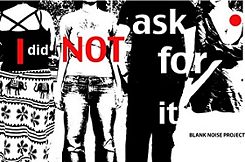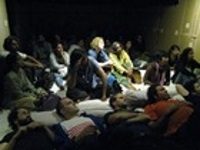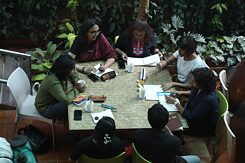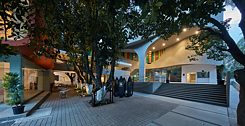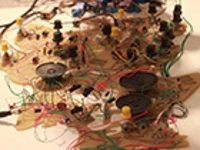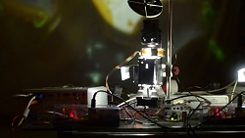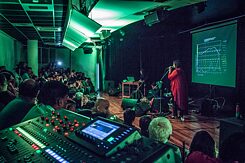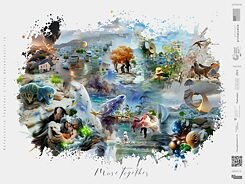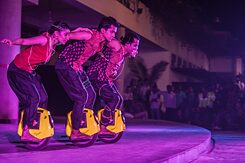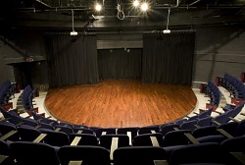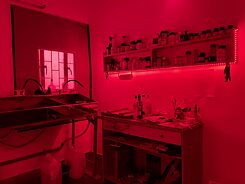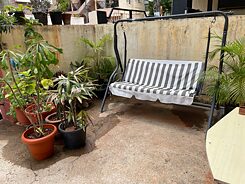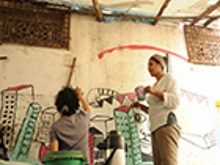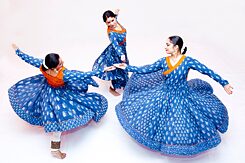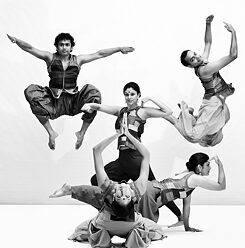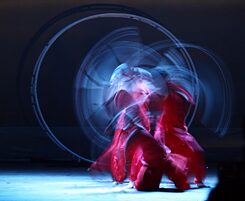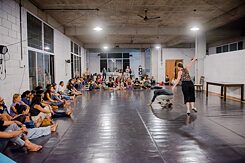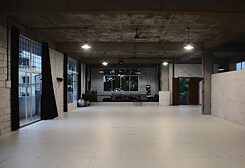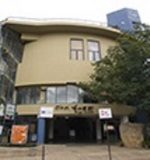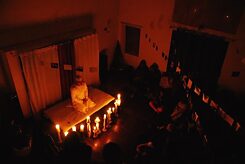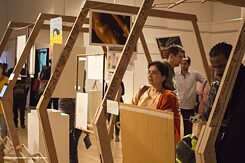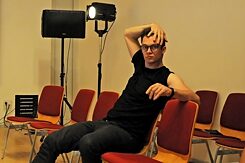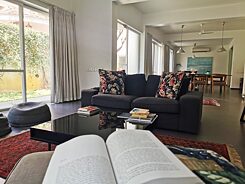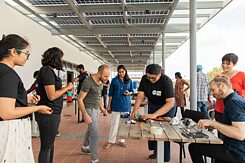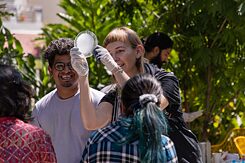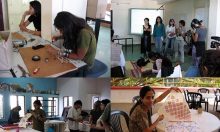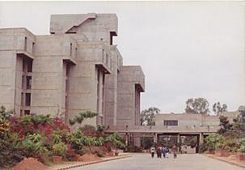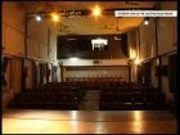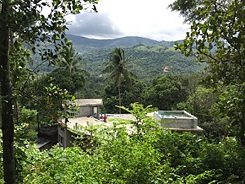Our Partners
The Goethe-Institut / Max Mueller Bhavan offers a bangaloREsidency in collaboration with 1Shanthiroad Studio/Gallery, a reputed atelier in Bangalore with simple, yet pleasant working and living spaces.
Since its inception in 2003, the gallery and residence at 1Shanthiroad have evolved into a popular meeting point for national and international artists. 1Shanthiroad offers a platform for several artists to create installations, performances and exhibitions. It provides space for local artists and a networking hub with international artists. It supports emerging artists from around the world, who want to realise their vision, whereby interaction, creative exchange and the experience with the local art community are integral elements.
CULTURE + COMMUNITY + CREATIVITY
As is well known to its large circle of well-wishers, 1Shanthiroad has acted as an eclectic and alternative art and social space for dialogue, discussions and creativity. Since its conception, 1Shanthiroad has supported emerging artists who might otherwise have few opportunities for showcasing their work, as well as nurtured talks and shows by seasoned artists and scholars.
1Shanthiroad’s inclusive and creative approaches have helped it become very rapidly a critical hub for visual culture not only in Bangalore but also within the country and outside, as is evident from the several artists and scholars from the US, Australia, Europe as well as other South Asian countries who have used this residency for creative symbiosis. In the process, 1Shanthiroad has helped challenge and push the boundaries of visual art practice.
Profile of our next bangaloREsident:
"The art residencies at 1Shanthiroad support international art exchanges that venture deeper into socio-cultural and emotionally-involved dialogues between the host, local art community and the artist-in-residence. We encourage collaboration, critique and conversation as the main building blocks that foster a relationship with us. We are keen to work with artists who are able to react and work in local circumstances, through their intent in the wider field of visual arts. This season we are keen to with work with artists in the fields of book art, urban archiving and mapping, curatorial practice and photography."
- Suresh Jayaram
Please note:
1Shanthiroad is the oldest bangaloREsidency and Suresh Jayaram is an experienced host who has helped numerous artists realise their projects.
bangaloREsidents 2024@1Shanthiroad:
♦ Gözde Ju
♦ Nancy Hammermeister
Most recent bangaloREsident@1Shanthiroad:
♦ Matthias Beckmann
Since its inception in 2003, the gallery and residence at 1Shanthiroad have evolved into a popular meeting point for national and international artists. 1Shanthiroad offers a platform for several artists to create installations, performances and exhibitions. It provides space for local artists and a networking hub with international artists. It supports emerging artists from around the world, who want to realise their vision, whereby interaction, creative exchange and the experience with the local art community are integral elements.
CULTURE + COMMUNITY + CREATIVITY
As is well known to its large circle of well-wishers, 1Shanthiroad has acted as an eclectic and alternative art and social space for dialogue, discussions and creativity. Since its conception, 1Shanthiroad has supported emerging artists who might otherwise have few opportunities for showcasing their work, as well as nurtured talks and shows by seasoned artists and scholars.
1Shanthiroad’s inclusive and creative approaches have helped it become very rapidly a critical hub for visual culture not only in Bangalore but also within the country and outside, as is evident from the several artists and scholars from the US, Australia, Europe as well as other South Asian countries who have used this residency for creative symbiosis. In the process, 1Shanthiroad has helped challenge and push the boundaries of visual art practice.
Profile of our next bangaloREsident:
"The art residencies at 1Shanthiroad support international art exchanges that venture deeper into socio-cultural and emotionally-involved dialogues between the host, local art community and the artist-in-residence. We encourage collaboration, critique and conversation as the main building blocks that foster a relationship with us. We are keen to work with artists who are able to react and work in local circumstances, through their intent in the wider field of visual arts. This season we are keen to with work with artists in the fields of book art, urban archiving and mapping, curatorial practice and photography."
- Suresh Jayaram
Please note:
1Shanthiroad is the oldest bangaloREsidency and Suresh Jayaram is an experienced host who has helped numerous artists realise their projects.
bangaloREsidents 2024@1Shanthiroad:
♦ Gözde Ju
♦ Nancy Hammermeister
Most recent bangaloREsident@1Shanthiroad:
♦ Matthias Beckmann
Subscribe to our Newsletter for updates on the next bangaloREsidency.
The Goethe-Institut / Max Mueller Bhavan offers a bangaloREsidency in collaboration with Abhinaya Taranga.
Abhinaya Taranga, that started in 1964 as a series theatre workshops, was developed into a full-blown theatre school in 1981. It is located in South Bangalore, and has been an important part of the cultural milieu of the City. It is an independent theatre school for working professionals from all walks of life, and has a rich history of eminent theatre personalities heading it. While the core activity of the school is theatre education, Abhinaya Taranga is also an intimate space that aims at creating synergies between different artistic, cultural and social diversities. A set up where new ideas are nourished and creative exchanges encouraged.
Abhinaya Taranga is looking for diverse collaborations that its students can benefit from, and is keen to collaborate with multidisciplinary artists who are willing to work with students of theatre and local artistes. We are looking for collaborators who are interested in continued partnerships as well.
Profile of our next bangaloREsident:
Abhinaya Taranga is open to any kind of collaboration that expands the ambit of artistic expression of our theatre students. An active engagement with a select group of our students and our local artistes, that culminates in a performative piece would be our ideal programme. We are looking to host an artiste from the theatre discipline, but are willing to host an artiste from any discipline ready to work with theatre students to create an interdisciplinary project. The residents would be provided living quarters at the institute.
bangaloREsident 2024@Abhinaya Taranga:
♦ Meike Redeker
Recent bangaloREsident@Abhinaya Taranga:
♦ Verena Regensburger
Subscribe to our Newsletter for updates on the next bangaloREsidency.
Abhinaya Taranga, that started in 1964 as a series theatre workshops, was developed into a full-blown theatre school in 1981. It is located in South Bangalore, and has been an important part of the cultural milieu of the City. It is an independent theatre school for working professionals from all walks of life, and has a rich history of eminent theatre personalities heading it. While the core activity of the school is theatre education, Abhinaya Taranga is also an intimate space that aims at creating synergies between different artistic, cultural and social diversities. A set up where new ideas are nourished and creative exchanges encouraged.
Abhinaya Taranga is looking for diverse collaborations that its students can benefit from, and is keen to collaborate with multidisciplinary artists who are willing to work with students of theatre and local artistes. We are looking for collaborators who are interested in continued partnerships as well.
Profile of our next bangaloREsident:
Abhinaya Taranga is open to any kind of collaboration that expands the ambit of artistic expression of our theatre students. An active engagement with a select group of our students and our local artistes, that culminates in a performative piece would be our ideal programme. We are looking to host an artiste from the theatre discipline, but are willing to host an artiste from any discipline ready to work with theatre students to create an interdisciplinary project. The residents would be provided living quarters at the institute.
bangaloREsident 2024@Abhinaya Taranga:
♦ Meike Redeker
Recent bangaloREsident@Abhinaya Taranga:
♦ Verena Regensburger
Subscribe to our Newsletter for updates on the next bangaloREsidency.
The Goethe-Institut / Max Mueller Bhavan offers a bangaloREsidency in collaboration with the Archives at National Centre for Biological Sciences (NCBS).
The Archives at NCBS is a public centre for the history of science in contemporary India that opened in February 2019. It has three main objectives going forward:
The campus encourages scientific and cultural interactions by hosting events such as lectures, workshops and exhibitions periodically, thus enhancing the exchange of ideas and knowledge between scholars involved with the programme and the community at large.
Our Artist-in-Residency Programme is an extension of this effort. Artists-in-Residence are free to work with any lab or group on campus. The campus is situated in a lush environment that provides steady support for its residents.
bangaloREsident 2024@NCBS:
♦ Iz Paehr
Most recent bangaloREsident@NCBS:
♦ Line Krom
Subscribe to our Newsletter for updates on the next bangaloREsidency.
The Archives at NCBS is a public centre for the history of science in contemporary India that opened in February 2019. It has three main objectives going forward:
- continuing to build up archives as spaces to strengthen the commons
- a focus on education through archival material and
- to build a broader consortium of archives with a discovery layer for the public to find, describe and share archival material and stories.
The campus encourages scientific and cultural interactions by hosting events such as lectures, workshops and exhibitions periodically, thus enhancing the exchange of ideas and knowledge between scholars involved with the programme and the community at large.
Our Artist-in-Residency Programme is an extension of this effort. Artists-in-Residence are free to work with any lab or group on campus. The campus is situated in a lush environment that provides steady support for its residents.
bangaloREsident 2024@NCBS:
♦ Iz Paehr
Most recent bangaloREsident@NCBS:
♦ Line Krom
Subscribe to our Newsletter for updates on the next bangaloREsidency.
The Goethe-Institut / Max Mueller Bhavan offers a bangaloREsidency in collaboration with Attakkalari Centre for Movement Arts.
Attakkalari Centre for Movement Arts is India’s premiere organisation working in the field of contemporary movement arts. Programmes include Education and Outreach, a Diploma in Movement Arts and Mixed Media, a Certificate Course in Movement Arts and Pedagogy, an Incubation Centre for the Arts and Media (ICAM), Research and Documentation, an archive of Indian Somatic Traditions and Contemporary Expressions called NAGARIKA, TransMedia Technologies, the Attakkalari India Biennial and the Attakkalari Dance Company. Established in 1992 and currently based in Bangalore, Attakkalari is headed by its Artistic Director, Jayachandran Palazhy.
Attakkalari is working on expanding its horizons and establishing a new “Centre for Innovation in Performing Arts” (CIPA) in the city. The proposed Centre for Innovation in Performing Arts will bring multiple performing art forms, allied disciplines and activities such as dance, theatre, music, stage technologies, visual and digital arts, literature as well as transdisciplinary endeavours, in a beautifully designed, lush campus in Bangalore. We hope to see it grow into a cultural hub that encourages resident and associated artists and organisations to experiment and explore out-of-the-box strategies that nurture artistic excellence in the community.
Diploma in Movement Arts and Mixed Media
This path-breaking project in the Indian contemporary dance scene, started in September 2006 and is led by eminent national and international artists. The curriculum emphasises vocational skills development and advanced training in various techniques focusing on performance, dance pedagogy, choreography, dance therapy, interdisciplinary studies, aesthetics, dance theory and arts management. The Diploma programme aims to help launch young dance artistes from the South Asia region as performers, choreographers and teachers in the national and international scene.
Building on Attakkalari's tremendous track record, the course is structured to provide overall fitness and body awareness, deeper insight into working with the concepts, principles and techniques of Indian physical and performance traditions as well as contemporary dance idioms, opportunities for research, working knowledge in stage technologies, tools for choreography and teaching.
Certificate Course in Movement Arts and Pedagogy
This unique, comprehensive and professional dance education programme draws from India’s rich physical and performance traditions and combines it with the latest developments in the global contemporary dance scene. It includes inputs in pedagogy, modules in fitness and stage technologies, and an extended apprenticeship. The programme is powered by Attakkalari’s huge expertise and experience gained over the years, through its interdisciplinary networks. Along with equipping young dancers with performance-oriented skills, the programme also aims to provide them with pedagogical training so that they may be able conduct classes on their own in the future. A carefully crafted internship programme at Attakkalari also offers students much needed work experience that helps them build their careers. The emphasis is on introducing students to physical skills and safe practices while nurturing their creativity and providing them in-depth experience in pedagogical methods and strategies.
The Incubation Centre for the Arts and Media (ICAM)
ICAM provides opportunities for artists to engage in transdisciplinary exploration involving dance and performing arts. Leveraging the fast-evolving ecology of creative entrepreneurship of Bangalore and the presence of an increasing number of arts practitioners from diverse backgrounds in the city, ICAM will help to forge creative collaborations and partnerships among artists and organisations. Working with Attakkalari’s national and international partners, ICAM strives to bring artists and resources under a collective umbrella to offer a safe, supportive and encouraging space to engage in creative experimentation leading to prototyping, production and performance of original performance works.
Attakkalari Studios
Attakkalari Studios are fully equipped spacious studios with mirrors, sprung wooden dance floor, and Wifi. We are able to provide technical equipment such as light, sound, camera and projectors. Attakkalari also has an intimate performance space called ‘Rangamandala’ which can host dance, theatre, conference, music, workshop or any other event format. We offer participants active mentoring support and studio space during the development of their work as well as limited production and technical support for the performance outcome. The resulting work may be showcased in Bangalore.
Profile of our next bangaloREsident: "The artist must be fluent in English. He/she/they will be working with local artists under our ICAM initiative as well as with our students in the Certificate Course and the Diploma programme.
The bangaloREsident should be prepared to work with all levels of dancers/students. Teaching assignments are expected of the bangaloREsident, for which details should be clarified directly with the host before the start of the residency."
- Jayachandran Palazhy
Most recent bangaloREsident@Attakkalari Centre for Movement Arts:
♦ Michael Maurissens
Subscribe to our Newsletter for updates on the next bangaloREsidency.
Attakkalari Centre for Movement Arts is India’s premiere organisation working in the field of contemporary movement arts. Programmes include Education and Outreach, a Diploma in Movement Arts and Mixed Media, a Certificate Course in Movement Arts and Pedagogy, an Incubation Centre for the Arts and Media (ICAM), Research and Documentation, an archive of Indian Somatic Traditions and Contemporary Expressions called NAGARIKA, TransMedia Technologies, the Attakkalari India Biennial and the Attakkalari Dance Company. Established in 1992 and currently based in Bangalore, Attakkalari is headed by its Artistic Director, Jayachandran Palazhy.
Attakkalari is working on expanding its horizons and establishing a new “Centre for Innovation in Performing Arts” (CIPA) in the city. The proposed Centre for Innovation in Performing Arts will bring multiple performing art forms, allied disciplines and activities such as dance, theatre, music, stage technologies, visual and digital arts, literature as well as transdisciplinary endeavours, in a beautifully designed, lush campus in Bangalore. We hope to see it grow into a cultural hub that encourages resident and associated artists and organisations to experiment and explore out-of-the-box strategies that nurture artistic excellence in the community.
Diploma in Movement Arts and Mixed Media
This path-breaking project in the Indian contemporary dance scene, started in September 2006 and is led by eminent national and international artists. The curriculum emphasises vocational skills development and advanced training in various techniques focusing on performance, dance pedagogy, choreography, dance therapy, interdisciplinary studies, aesthetics, dance theory and arts management. The Diploma programme aims to help launch young dance artistes from the South Asia region as performers, choreographers and teachers in the national and international scene.
Building on Attakkalari's tremendous track record, the course is structured to provide overall fitness and body awareness, deeper insight into working with the concepts, principles and techniques of Indian physical and performance traditions as well as contemporary dance idioms, opportunities for research, working knowledge in stage technologies, tools for choreography and teaching.
Certificate Course in Movement Arts and Pedagogy
This unique, comprehensive and professional dance education programme draws from India’s rich physical and performance traditions and combines it with the latest developments in the global contemporary dance scene. It includes inputs in pedagogy, modules in fitness and stage technologies, and an extended apprenticeship. The programme is powered by Attakkalari’s huge expertise and experience gained over the years, through its interdisciplinary networks. Along with equipping young dancers with performance-oriented skills, the programme also aims to provide them with pedagogical training so that they may be able conduct classes on their own in the future. A carefully crafted internship programme at Attakkalari also offers students much needed work experience that helps them build their careers. The emphasis is on introducing students to physical skills and safe practices while nurturing their creativity and providing them in-depth experience in pedagogical methods and strategies.
The Incubation Centre for the Arts and Media (ICAM)
ICAM provides opportunities for artists to engage in transdisciplinary exploration involving dance and performing arts. Leveraging the fast-evolving ecology of creative entrepreneurship of Bangalore and the presence of an increasing number of arts practitioners from diverse backgrounds in the city, ICAM will help to forge creative collaborations and partnerships among artists and organisations. Working with Attakkalari’s national and international partners, ICAM strives to bring artists and resources under a collective umbrella to offer a safe, supportive and encouraging space to engage in creative experimentation leading to prototyping, production and performance of original performance works.
Attakkalari Studios
Attakkalari Studios are fully equipped spacious studios with mirrors, sprung wooden dance floor, and Wifi. We are able to provide technical equipment such as light, sound, camera and projectors. Attakkalari also has an intimate performance space called ‘Rangamandala’ which can host dance, theatre, conference, music, workshop or any other event format. We offer participants active mentoring support and studio space during the development of their work as well as limited production and technical support for the performance outcome. The resulting work may be showcased in Bangalore.
Profile of our next bangaloREsident: "The artist must be fluent in English. He/she/they will be working with local artists under our ICAM initiative as well as with our students in the Certificate Course and the Diploma programme.
The bangaloREsident should be prepared to work with all levels of dancers/students. Teaching assignments are expected of the bangaloREsident, for which details should be clarified directly with the host before the start of the residency."
- Jayachandran Palazhy
Most recent bangaloREsident@Attakkalari Centre for Movement Arts:
♦ Michael Maurissens
Subscribe to our Newsletter for updates on the next bangaloREsidency.
The Goethe-Institut / Max Mueller Bhavan offers a bangaloREsidency in collaboration with Blank Noise, a volunteer-led collective committed to addressing street harassment.
Blank Noise is a community/public art project that seeks to confront street harassment, commonly known as eve teasing, in India. The project started out as a student project at the Srishti School of Art Design & Technology in Bangalore and has since spread to other cities in India, such as Mumbai, Delhi, Chennai, Calcutta, Chandigarh, Hyderabad and Lucknow. It tackles the notion of shame and blame through campaigns such as "I Never Ask For It".
The bangaloREsidency with Blank Noise calls for artists with an interest in tackling sexual violence and building safe cities. In its current phase, Blank Noise will focus towards "I Never Ask For It". Most women across geographies remember what they wore when they experienced any form of sexual violence.
The campaign asks women to send that one garment as a witness, a testimonial and a rejection of blame; thereby building a mobile installation of garments saying there is no excuse for sexual violence. Artists from across disciplines, interested in building discourse around rejecting blame are encouraged to apply.
The bangaloREsident will be expected to join hands and be part of the "Action Hero" community working on the campaign. "I Never Ask For It" will build over a period of two years and involves various aspects from film, performance, youtube videos, street actions, street interventions.
The artist will also be expected to make connections with organisations to enable parallel conversations/events in Germany and to create awareness for the project abroad.
Should you wish to address the issue of blame outside of the clothes installation building you are welcome to submit an independent proposal or work along the proposed format of the campaign.
Recent bangaloREsident@Blank Noise:
♦ Lino Heissenberg
Subscribe to our Newsletter for updates on the next bangaloREsidency.
Blank Noise is a community/public art project that seeks to confront street harassment, commonly known as eve teasing, in India. The project started out as a student project at the Srishti School of Art Design & Technology in Bangalore and has since spread to other cities in India, such as Mumbai, Delhi, Chennai, Calcutta, Chandigarh, Hyderabad and Lucknow. It tackles the notion of shame and blame through campaigns such as "I Never Ask For It".
The bangaloREsidency with Blank Noise calls for artists with an interest in tackling sexual violence and building safe cities. In its current phase, Blank Noise will focus towards "I Never Ask For It". Most women across geographies remember what they wore when they experienced any form of sexual violence.
The campaign asks women to send that one garment as a witness, a testimonial and a rejection of blame; thereby building a mobile installation of garments saying there is no excuse for sexual violence. Artists from across disciplines, interested in building discourse around rejecting blame are encouraged to apply.
The bangaloREsident will be expected to join hands and be part of the "Action Hero" community working on the campaign. "I Never Ask For It" will build over a period of two years and involves various aspects from film, performance, youtube videos, street actions, street interventions.
The artist will also be expected to make connections with organisations to enable parallel conversations/events in Germany and to create awareness for the project abroad.
Should you wish to address the issue of blame outside of the clothes installation building you are welcome to submit an independent proposal or work along the proposed format of the campaign.
Recent bangaloREsident@Blank Noise:
♦ Lino Heissenberg
Subscribe to our Newsletter for updates on the next bangaloREsidency.
The Goethe-Institut / Max Mueller Bhavan offers a bangaloREsidency in collaboration with Experimenta India and Srishti Institute of Art, Design & Technology.
The resident will be hosted by Srishti Manipal Institute of Art, Design and Technology where she/he will be expected to take experimental film / video workshops, and also get involved with organising Experimenta - the International Festival of Moving Image Art. Experimenta India will facilitate interactions and create networking opportunities for the resident with leading artists, filmmakers, curators, cultural organisations and academic institutions in Bangalore.
Experimenta India is an artist run platform that encourages uncompromising, fresh, compelling and critically urgent experimentation with the moving image in India.
Founded by filmmaker Shai Heredia in 2003, this groundbreaking platform has over the years played a significant role in countering the hegemony of the mainstream Indian film industry. Through nurturing an alternative community that reflects upon, and examines the different traces of Indian artists’ film and video, both historical and contemporary, we engage in a series of projects that bring together Indian and international film artists with similar creative and socio-political concerns.
Besides curating EXPERIMENTA, the critically acclaimed bi-annual festival, we also showcase Indian experimental film and video at international film festivals and art venues like the Tate Modern (London), the Berlinale (Berlin), Images Festival (Toronto), EXiS Festival (Seoul) amongst others.
While bringing Indian moving image art into international prominence, we have also hosted international artists’ residencies in Mumbai and Bangalore, curated regular screenings and conducted film art workshops across India. Ultimately as an alternative community we have played a significant role in evolving independent, new and radical discourse for film as an art practice in India.
Srishti Manipal Institute of Art, Design and Technology, Bangalore is a visionary, experimental & curatorial institution of media arts & sciences that seeks to contextualise the latest art, craft & design ideas and practices in the emerging Indian context, producing creative innovations that help understand, communicate and resolve some of the contemporary questions, issues and concerns facing society and culture. Set up in 1996 by a not-for-profit educational trust, Srishti has been offering a range of art & design educational programmes at the undergraduate & postgraduate levels. Education remains its core activity, even as its organic growth has led it into diverse areas of research, curation and practice. Srishti embraces interdisciplinary as its mode of enquiry and creative action.
Recent bangaloREsident@Experimenta India:
♦ Bernd Lützeler
Subscribe to our Newsletter for updates on the next bangaloREsidency.
The resident will be hosted by Srishti Manipal Institute of Art, Design and Technology where she/he will be expected to take experimental film / video workshops, and also get involved with organising Experimenta - the International Festival of Moving Image Art. Experimenta India will facilitate interactions and create networking opportunities for the resident with leading artists, filmmakers, curators, cultural organisations and academic institutions in Bangalore.
Experimenta India is an artist run platform that encourages uncompromising, fresh, compelling and critically urgent experimentation with the moving image in India.
Founded by filmmaker Shai Heredia in 2003, this groundbreaking platform has over the years played a significant role in countering the hegemony of the mainstream Indian film industry. Through nurturing an alternative community that reflects upon, and examines the different traces of Indian artists’ film and video, both historical and contemporary, we engage in a series of projects that bring together Indian and international film artists with similar creative and socio-political concerns.
Besides curating EXPERIMENTA, the critically acclaimed bi-annual festival, we also showcase Indian experimental film and video at international film festivals and art venues like the Tate Modern (London), the Berlinale (Berlin), Images Festival (Toronto), EXiS Festival (Seoul) amongst others.
While bringing Indian moving image art into international prominence, we have also hosted international artists’ residencies in Mumbai and Bangalore, curated regular screenings and conducted film art workshops across India. Ultimately as an alternative community we have played a significant role in evolving independent, new and radical discourse for film as an art practice in India.
Srishti Manipal Institute of Art, Design and Technology, Bangalore is a visionary, experimental & curatorial institution of media arts & sciences that seeks to contextualise the latest art, craft & design ideas and practices in the emerging Indian context, producing creative innovations that help understand, communicate and resolve some of the contemporary questions, issues and concerns facing society and culture. Set up in 1996 by a not-for-profit educational trust, Srishti has been offering a range of art & design educational programmes at the undergraduate & postgraduate levels. Education remains its core activity, even as its organic growth has led it into diverse areas of research, curation and practice. Srishti embraces interdisciplinary as its mode of enquiry and creative action.
Recent bangaloREsident@Experimenta India:
♦ Bernd Lützeler
Subscribe to our Newsletter for updates on the next bangaloREsidency.
The Goethe-Institut / Max Mueller Bhavan offers a bangaloREsidency in collaboration with the Media Lab of the Indian Institute for Human Settlements (IIHS).
India’s urbanisation is the second largest rural to urban transition in human history. By 2050, at least 800 million Indians will live in cities and they will constitute more than half of India’s population. This is not just a demographic transition. Urbanisation is fundamentally changing India’s economy, society, politics as well as culture. In this context, the IIHS is committed to the equitable, sustainable and efficient transformation of Indian settlements. As a research and education institution, our role is to engage with these changing cultural scenarios along with the changing landscape of urban India.
The Media Lab at IIHS is a platform that engages with questions around the urban through multiple media practices. In a rapidly changing complex world, the Media Lab has created a space where the use of images and sound can be a way of understanding the urban milieu and create new forms of knowledge production.
The Media Lab views the audio-visual medium as a method for research. These films, images and sounds breathe life into facts and data in the form of stories. The Media Lab’s mandate is to build a culture of research, teaching and pedagogy inside and outside the classroom using digital audio-video. The Lab uses a range of approaches to fulfil its mission including short courses on filmmaking and photography, hosting an audio-visual repository on YouTube along with regular screenings and its flagship annual event - the Urban Lens Film Festival.
The IIHS Media Lab is a space where creative expressions on the urban, irrespective of the media form, can be showcased so that multiple ‘ways of seeing’ can lead to a newer and different understanding of the cities.
The Urban Lens Film Festival which will be in its 6th edition is a one of a kind film festival that focusses on cinema and the city. The idea behind the festival is to look at the different ways in which filmmakers/artists engage with the idea of the city through cinema. These fiction, non-fiction and animation films mirror a cinematic truth about cities, framing them beyond their skylines by teasing out individual/collective stories and experiences of people from around the world.
Profile of our next bangaloREsident:
The Media Lab at IIHS is inviting applications from photographers, sound / audio-visual artists to use the city and its public spaces to find images, sounds and stories that can re-create the urban landscape of Bengaluru. The Media Lab encourages new forms of production and exhibition right from art, installation pieces, new media or the internet.
In addition to the audio-visual equipment and software available at the Media Lab, there is opportunity to refer to the resources of the IIHS library (journals, films, books and maps) to support the resident during their work process. Residents will have access to leading academics and practitioners at the IIHS who work on some of the most pivotal themes, challenges and solutions in the field of the urban.
The residency will culminate with an exhibition / talk about the work produced. There is also an opportunity to display the work in the gallery during the Urban Lens Film Festival. IIHS is a teaching-learning institution and hence the resident is also encouraged to conduct either a workshop or a masterclass at the end of the residency.
Recent bangaloREsidents@IIHS:
♦ Raisa Galofre & Marvin Systermans
Subscribe to our Newsletter for updates on the next bangaloREsidency.
India’s urbanisation is the second largest rural to urban transition in human history. By 2050, at least 800 million Indians will live in cities and they will constitute more than half of India’s population. This is not just a demographic transition. Urbanisation is fundamentally changing India’s economy, society, politics as well as culture. In this context, the IIHS is committed to the equitable, sustainable and efficient transformation of Indian settlements. As a research and education institution, our role is to engage with these changing cultural scenarios along with the changing landscape of urban India.
The Media Lab at IIHS is a platform that engages with questions around the urban through multiple media practices. In a rapidly changing complex world, the Media Lab has created a space where the use of images and sound can be a way of understanding the urban milieu and create new forms of knowledge production.
The Media Lab views the audio-visual medium as a method for research. These films, images and sounds breathe life into facts and data in the form of stories. The Media Lab’s mandate is to build a culture of research, teaching and pedagogy inside and outside the classroom using digital audio-video. The Lab uses a range of approaches to fulfil its mission including short courses on filmmaking and photography, hosting an audio-visual repository on YouTube along with regular screenings and its flagship annual event - the Urban Lens Film Festival.
The IIHS Media Lab is a space where creative expressions on the urban, irrespective of the media form, can be showcased so that multiple ‘ways of seeing’ can lead to a newer and different understanding of the cities.
The Urban Lens Film Festival which will be in its 6th edition is a one of a kind film festival that focusses on cinema and the city. The idea behind the festival is to look at the different ways in which filmmakers/artists engage with the idea of the city through cinema. These fiction, non-fiction and animation films mirror a cinematic truth about cities, framing them beyond their skylines by teasing out individual/collective stories and experiences of people from around the world.
Profile of our next bangaloREsident:
The Media Lab at IIHS is inviting applications from photographers, sound / audio-visual artists to use the city and its public spaces to find images, sounds and stories that can re-create the urban landscape of Bengaluru. The Media Lab encourages new forms of production and exhibition right from art, installation pieces, new media or the internet.
In addition to the audio-visual equipment and software available at the Media Lab, there is opportunity to refer to the resources of the IIHS library (journals, films, books and maps) to support the resident during their work process. Residents will have access to leading academics and practitioners at the IIHS who work on some of the most pivotal themes, challenges and solutions in the field of the urban.
The residency will culminate with an exhibition / talk about the work produced. There is also an opportunity to display the work in the gallery during the Urban Lens Film Festival. IIHS is a teaching-learning institution and hence the resident is also encouraged to conduct either a workshop or a masterclass at the end of the residency.
Recent bangaloREsidents@IIHS:
♦ Raisa Galofre & Marvin Systermans
Subscribe to our Newsletter for updates on the next bangaloREsidency.
The Goethe-Institut / Max Mueller Bhavan offers a bangaloREsidency in collaboration with the Word Lab at the Indian Institute for Human Settlements (IIHS).
The Word Lab is an integral part of IIHS which conceptualises how the institution’s erudite scholarship can be made accessible and inclusive. At the Word Lab, we bring diverse voices together to look at how urban experiences are revealed in contemporary art and literature. We edit and publish books, reports and institutional knowledge narratives to advance the frontiers of scholarly knowledge. We create an invigorating environment for our practitioners and researchers by engaging with best practices in writing.
The Lab acts as a bridge between the institute and the public, disseminating our work to a wider audience through accessible writing and public-facing events. We organise an annual writings festival, City Scripts, which is a three-day celebration of writings that bring alive the city as seen through a myriad lenses. The festival has brought together eminent authors, journalists, architects, poets, artists and others, and centre-staged urban contemporary writings across forms through conversations, readings, panel discussions and workshops.
Every year, the festival engages with critical current issues such as climate change, sanitation, disaster risk resilience, identity, language and translation, and digital labour, among other evolving themes from IIHS’s cutting-edge research on urbanisation in the global South.
Profile of our first-ever bangaloREsident:
Through the residency, we are looking for someone who can comparatively / critically / creatively approach issues pertaining to life in cities. Our ideal candidate is someone who can creatively look at field research and data produced by various projects at the institute. The residency will culminate in a performance / exhibition, and will include an opportunity to conduct an internal workshop for the IIHS staff.
The residents can have a background in any discipline, given that IIHS strongly believes in interdisciplinary work. They are welcome to use the vast resources available at the IIHS public reference library. These include a variety of books, audio-visual material, maps, data libraries, and journals. We also have archival collections which give a glimpse into the past of Indian cities.
bangaloREsident 2024@IIHS:
♦ Frida Teller
Subscribe to our Newsletter for updates on the next bangaloREsidency.
The Word Lab is an integral part of IIHS which conceptualises how the institution’s erudite scholarship can be made accessible and inclusive. At the Word Lab, we bring diverse voices together to look at how urban experiences are revealed in contemporary art and literature. We edit and publish books, reports and institutional knowledge narratives to advance the frontiers of scholarly knowledge. We create an invigorating environment for our practitioners and researchers by engaging with best practices in writing.
The Lab acts as a bridge between the institute and the public, disseminating our work to a wider audience through accessible writing and public-facing events. We organise an annual writings festival, City Scripts, which is a three-day celebration of writings that bring alive the city as seen through a myriad lenses. The festival has brought together eminent authors, journalists, architects, poets, artists and others, and centre-staged urban contemporary writings across forms through conversations, readings, panel discussions and workshops.
Every year, the festival engages with critical current issues such as climate change, sanitation, disaster risk resilience, identity, language and translation, and digital labour, among other evolving themes from IIHS’s cutting-edge research on urbanisation in the global South.
Profile of our first-ever bangaloREsident:
Through the residency, we are looking for someone who can comparatively / critically / creatively approach issues pertaining to life in cities. Our ideal candidate is someone who can creatively look at field research and data produced by various projects at the institute. The residency will culminate in a performance / exhibition, and will include an opportunity to conduct an internal workshop for the IIHS staff.
The residents can have a background in any discipline, given that IIHS strongly believes in interdisciplinary work. They are welcome to use the vast resources available at the IIHS public reference library. These include a variety of books, audio-visual material, maps, data libraries, and journals. We also have archival collections which give a glimpse into the past of Indian cities.
bangaloREsident 2024@IIHS:
♦ Frida Teller
Subscribe to our Newsletter for updates on the next bangaloREsidency.
The Goethe-Institut / Max Mueller Bhavan offers a bangaloREsidency in collaboration with Indian Music Experience Museum (IME), India’s only interactive music museum.
IME is India’s only museum dedicated to showcasing the history and development of music in India. It is also one among a handful of experimental music museums around the world. The Museum’s work is spread across exhibitions, programmes, community outreach events and education. As an institution, its vision is to spread awareness of India’s rich musical heritage to diverse audiences, especially the youth. Spread across nine galleries, the museum has audio-visual interactives, a stunning display of 100+ instruments, a recording studio, instruments and memorabilia from renowned Indian musicians. Besides its nine galleries, the museum has a sound garden, a learning centre for music education, several performance spaces and a café.
For the bangaloREsidency we encourage artists and musicians in the following directions:
• Digital archive of Indian music – There is ample material in the museum to spark inspiration and encourage artists in residence to work on project ideas with materials in the museum and also form collaborations with local musicians for study, research or performances.
• Create an expression (performing, visual, digital) based on the museum’s collection – IME provides an enriching and conducive environment for artists to immerse themselves in a musical heritage that is many centuries old and has influences from around the world. This is ideal for artists seeking inspiration from the different forms of Indian music, and to exploring local forms of music traditions and practices.
• Interpreting our collection – IME invites musicologists, historians, artists and professionals working in the field of music to interpret the museum’s collection through different lenses to offer new perspectives that may broaden the scope of scholarship around the museum’s collection.
• Music across borders – Music knows no borders. There are countless accounts of several path-breaking Indian musicians who have travelled the world and collaborated with international artists to produce seminal works of fusion in the museum. There is ample scope to research and unravel interesting stories on fusion music, the socio-political contexts in which they evolved, the influences they imbibed along the way, and their significance today that could make for a great exhibition, documentary or paper.
We also encourage artists to go through our website and develop their own residency ideas based on their areas of interest in music and their artistic practice.
bangaloREsident 2024@IME:
♦ Keno Langbein
Most recent bangaloREsident@IME:
♦ Julius Gabriel
Subscribe to our Newsletter for updates on the next bangaloREsidency.
IME is India’s only museum dedicated to showcasing the history and development of music in India. It is also one among a handful of experimental music museums around the world. The Museum’s work is spread across exhibitions, programmes, community outreach events and education. As an institution, its vision is to spread awareness of India’s rich musical heritage to diverse audiences, especially the youth. Spread across nine galleries, the museum has audio-visual interactives, a stunning display of 100+ instruments, a recording studio, instruments and memorabilia from renowned Indian musicians. Besides its nine galleries, the museum has a sound garden, a learning centre for music education, several performance spaces and a café.
For the bangaloREsidency we encourage artists and musicians in the following directions:
• Digital archive of Indian music – There is ample material in the museum to spark inspiration and encourage artists in residence to work on project ideas with materials in the museum and also form collaborations with local musicians for study, research or performances.
• Create an expression (performing, visual, digital) based on the museum’s collection – IME provides an enriching and conducive environment for artists to immerse themselves in a musical heritage that is many centuries old and has influences from around the world. This is ideal for artists seeking inspiration from the different forms of Indian music, and to exploring local forms of music traditions and practices.
• Interpreting our collection – IME invites musicologists, historians, artists and professionals working in the field of music to interpret the museum’s collection through different lenses to offer new perspectives that may broaden the scope of scholarship around the museum’s collection.
• Music across borders – Music knows no borders. There are countless accounts of several path-breaking Indian musicians who have travelled the world and collaborated with international artists to produce seminal works of fusion in the museum. There is ample scope to research and unravel interesting stories on fusion music, the socio-political contexts in which they evolved, the influences they imbibed along the way, and their significance today that could make for a great exhibition, documentary or paper.
We also encourage artists to go through our website and develop their own residency ideas based on their areas of interest in music and their artistic practice.
bangaloREsident 2024@IME:
♦ Keno Langbein
Most recent bangaloREsident@IME:
♦ Julius Gabriel
Subscribe to our Newsletter for updates on the next bangaloREsidency.
The Goethe-Institut / Max Mueller Bhavan offers a bangaloREsidency in collaboration with the Indian Sonic Research Organisation (The ISRO).
The ISRO is a collective dedicated to the proliferation of creative music and experiments in sound. They are instrument builders and artists. Performances incorporate DIY and home-made instruments made with discarded electronics and other found objects.
They also run a community music lab and record label which disseminates works by Asian composers, sound artists and musicians.
bangaloREsident 2024@the ISRO:
♦ Firat Yildiz
Most recent bangaloREsident@the ISRO:
♦ Kathrin Lambert
Subscribe to our Newsletter for updates on the next bangaloREsidency.
The ISRO is a collective dedicated to the proliferation of creative music and experiments in sound. They are instrument builders and artists. Performances incorporate DIY and home-made instruments made with discarded electronics and other found objects.
They also run a community music lab and record label which disseminates works by Asian composers, sound artists and musicians.
bangaloREsident 2024@the ISRO:
♦ Firat Yildiz
Most recent bangaloREsident@the ISRO:
♦ Kathrin Lambert
Subscribe to our Newsletter for updates on the next bangaloREsidency.
The Goethe-Institut / Max Mueller Bhavan offers a bangaloREsidency in collaboration with Infinite Souls Farm and Artists' Retreat, a 7-acre organic farm and rural artists retreat run by Kirtana Kumar (theatre artist) and Konarak Reddy (musician).
Infinite Souls Farm lies in the shadow of the historic monolith, Savandurga, about 40 km from Bangalore. It is a completely unfunded space that is sustained by the workshops, residencies and performances it hosts. Infinite Souls was inaugurated in 2007 with an International Theatre Residency facilitated by Josefina Baez of Ay Ombe Theatre, New York. Since then it has hosted more than 1000 Indian and international artists from Sri Lanka, Bangladesh, Pakistan, Taiwan, Germany, UK, Israel, Hungary, Poland, France, Canada and the US. Infinite Souls houses a maximum of 20 people in cottages and 60 in tents and cottages.
Ongoing programmes:
Guitar Gita – sharing of Konarak’s music practice through one-on-one classes and interactions.
Infinite Souls Summer Camps – residential music and theatre camps for young people.
Little Jasmine Films – for the making of documentary and experimental films. Watch Guhya online at pad.ma. Or visit our Youtube channel.
Little Jasmine Theatre Project – a professional theatre-making unit that creates urban Indian plays through the exploration of intersectional issues such as caste, gender, sexuality and identity. Watch a digital work here.
Theatre Lab (Youth) – an annual pedagogical programme for young people run by Kirtana..
World Guitar Nights – a biennial international guitar festival curated and hosted by Konarak
Profile of our next bangaloREsident:
Infinite Souls is looking for an artist who seeks nature and solitude; who works in the field of arts academia, music, film, theatre and associated practices.
Recent bangaloREsident@Infinite Souls Farm and Artists Retreat:
♦ Kris Merken
Subscribe to our Newsletter for updates on the next bangaloREsidency.
Infinite Souls Farm lies in the shadow of the historic monolith, Savandurga, about 40 km from Bangalore. It is a completely unfunded space that is sustained by the workshops, residencies and performances it hosts. Infinite Souls was inaugurated in 2007 with an International Theatre Residency facilitated by Josefina Baez of Ay Ombe Theatre, New York. Since then it has hosted more than 1000 Indian and international artists from Sri Lanka, Bangladesh, Pakistan, Taiwan, Germany, UK, Israel, Hungary, Poland, France, Canada and the US. Infinite Souls houses a maximum of 20 people in cottages and 60 in tents and cottages.
Ongoing programmes:
Guitar Gita – sharing of Konarak’s music practice through one-on-one classes and interactions.
Infinite Souls Summer Camps – residential music and theatre camps for young people.
Little Jasmine Films – for the making of documentary and experimental films. Watch Guhya online at pad.ma. Or visit our Youtube channel.
Little Jasmine Theatre Project – a professional theatre-making unit that creates urban Indian plays through the exploration of intersectional issues such as caste, gender, sexuality and identity. Watch a digital work here.
Theatre Lab (Youth) – an annual pedagogical programme for young people run by Kirtana..
World Guitar Nights – a biennial international guitar festival curated and hosted by Konarak
Profile of our next bangaloREsident:
Infinite Souls is looking for an artist who seeks nature and solitude; who works in the field of arts academia, music, film, theatre and associated practices.
Recent bangaloREsident@Infinite Souls Farm and Artists Retreat:
♦ Kris Merken
Subscribe to our Newsletter for updates on the next bangaloREsidency.
The Goethe-Institut / Max Mueller Bhavan offers a bangaloREsidency in collaboration with Jaaga.
Jaaga builds collaborative communities to address urban issues through researched arts and design practices in collaboration with public and private, grassroots organisations.
Jaaga is a collaborative co-working community of design, tech and social entrepreneurs. Our co-working space is housed in a 650 sq. m. penthouse in the heart of Bangalore with the city’s most interesting independent techies and designers. Since its inception in 2009, Jaaga has followed an organic framework to encourage meaningful collaborations between individuals working within the fields of art, technology and activism.
Jaaga has incubated BeFantastic.in, a platform that brings together transdisciplinary practices of art and technology with a commitment to envision an open and optimistic vision for the future. BeFantastic emerged from the city’s first TechArt festival titled Bengaluru Fantastic which took place at the heart of the city in December 2017 spread over 3 days. The festival had over 30 pieces of tech-art, in addition to music and dance performances, workshops, talks, panels & screenings. From this first edition, BeFantastic has sought to align the engagements with the UN's Sustainable Development Goals and this is a commitment that has persisted through subsequent activities.
BeFantastic facilitates creative interactions for the digital era through their annual online Fellowship programmes. Working specifically at various intersections of art and technology, they have sought to bring together a global community of TechArt enthusiasts through creative and critical engagements through BeFantastic Pivot (2020) and BeFantastic Together (2021). Following the curatorial direction of ‘Techart for Climate Action’, they are organising this year’s flagship Fellowship in 2022, titled BeFantastic Within and BeFantastic Beyond. All these engagements are geared towards a public TechArt festival that is to be organised physically across Bengaluru in 2023 titled Future Fantastic. Also do explore their AI-based chatbots titled Radbots.
Future Fantastic is envisioned as an AI+Art festival that brings together cutting-edge art practices and discourses within this expanded field to Bangalore. Guided by the ethos of climate justice and Jaaga’s dedication to working in public spaces, it hopes to create a space for dialogue around the various dimensions of the ongoing climate emergency through interventions mediated by the leading practitioners in various relevant fields. Towards this end, BeFantastic Within has been conceptualised as a Fellowship marrying the worlds of performance and AI, and BeFantastic Beyond is to revolve around visual art practices that incorporates various emerging technologies. You can explore their more recent activities through the newsletter archive.
Profile of the next bangaloREsident:
Jaaga’s BeFantastic chooses residents based on their work and demonstrated interest to connect and explore cities through participatory creative practice that intersects art, technology and activism. Their team provides a window into the heart of Bangalore’s cultural, tech and activist circles and will guide their guests’ experience of the city through a nuanced and informed lens. Residents are expected to honour the unique perspective and connections on offer with their own work and fresh perspectives, and are invited to hold work collaboratively with selected artists from Bangalore.
If you are a bangaloREsident@Jaaga, you will also be given the opportunity to contribute to Future Fantastic in 2023, alongside key figures working in the fields of AI, TechArt and climate action from around the world. BeFantastic is particularly interested in artists, choreographers, creative directors, creative technologists, filmmakers who are interested in tech, coding, and creating interactive online digital art for performances, or tech-art installations, with a special interest in artificial intelligence and machine learning.
Please note:
We no longer have a dedicated residency space in the city center. Information about accommodation may change at short notice. Our Living Building is nomadic and has moved 6 times in the last ten years.
Recent bangaloREsident@Jaaga:
♦ Walter Solon
Subscribe to our Newsletter for updates on the next bangaloREsidency.
Jaaga builds collaborative communities to address urban issues through researched arts and design practices in collaboration with public and private, grassroots organisations.
Jaaga is a collaborative co-working community of design, tech and social entrepreneurs. Our co-working space is housed in a 650 sq. m. penthouse in the heart of Bangalore with the city’s most interesting independent techies and designers. Since its inception in 2009, Jaaga has followed an organic framework to encourage meaningful collaborations between individuals working within the fields of art, technology and activism.
Jaaga has incubated BeFantastic.in, a platform that brings together transdisciplinary practices of art and technology with a commitment to envision an open and optimistic vision for the future. BeFantastic emerged from the city’s first TechArt festival titled Bengaluru Fantastic which took place at the heart of the city in December 2017 spread over 3 days. The festival had over 30 pieces of tech-art, in addition to music and dance performances, workshops, talks, panels & screenings. From this first edition, BeFantastic has sought to align the engagements with the UN's Sustainable Development Goals and this is a commitment that has persisted through subsequent activities.
BeFantastic facilitates creative interactions for the digital era through their annual online Fellowship programmes. Working specifically at various intersections of art and technology, they have sought to bring together a global community of TechArt enthusiasts through creative and critical engagements through BeFantastic Pivot (2020) and BeFantastic Together (2021). Following the curatorial direction of ‘Techart for Climate Action’, they are organising this year’s flagship Fellowship in 2022, titled BeFantastic Within and BeFantastic Beyond. All these engagements are geared towards a public TechArt festival that is to be organised physically across Bengaluru in 2023 titled Future Fantastic. Also do explore their AI-based chatbots titled Radbots.
Future Fantastic is envisioned as an AI+Art festival that brings together cutting-edge art practices and discourses within this expanded field to Bangalore. Guided by the ethos of climate justice and Jaaga’s dedication to working in public spaces, it hopes to create a space for dialogue around the various dimensions of the ongoing climate emergency through interventions mediated by the leading practitioners in various relevant fields. Towards this end, BeFantastic Within has been conceptualised as a Fellowship marrying the worlds of performance and AI, and BeFantastic Beyond is to revolve around visual art practices that incorporates various emerging technologies. You can explore their more recent activities through the newsletter archive.
Profile of the next bangaloREsident:
Jaaga’s BeFantastic chooses residents based on their work and demonstrated interest to connect and explore cities through participatory creative practice that intersects art, technology and activism. Their team provides a window into the heart of Bangalore’s cultural, tech and activist circles and will guide their guests’ experience of the city through a nuanced and informed lens. Residents are expected to honour the unique perspective and connections on offer with their own work and fresh perspectives, and are invited to hold work collaboratively with selected artists from Bangalore.
If you are a bangaloREsident@Jaaga, you will also be given the opportunity to contribute to Future Fantastic in 2023, alongside key figures working in the fields of AI, TechArt and climate action from around the world. BeFantastic is particularly interested in artists, choreographers, creative directors, creative technologists, filmmakers who are interested in tech, coding, and creating interactive online digital art for performances, or tech-art installations, with a special interest in artificial intelligence and machine learning.
Please note:
We no longer have a dedicated residency space in the city center. Information about accommodation may change at short notice. Our Living Building is nomadic and has moved 6 times in the last ten years.
Recent bangaloREsident@Jaaga:
♦ Walter Solon
Subscribe to our Newsletter for updates on the next bangaloREsidency.
The Goethe-Institut / Max Mueller Bhavan offers a bangaloREsidency in collaboration with Jagriti Theatre.
Artistic Vision
Since Jagriti Theatre opened in January 2011, it has always sought to create and sustain performance art practice in the city. It has continuously supported emerging talent in theatre, music, dance and comedy. As well as young artists in the city, providing professional spaces to showcase talent. It has provided sustainable work opportunities for artists, arts managers and theatre educators.
As we re-examine the idea of performance and live engagement in a post-pandemic world, Jagriti will continue to work towards creating space for artistic collaboration, community engagement through the arts and interdisciplinary arts education opportunities; with a commitment to embrace a more diverse, culturally impactful and inclusive construct of art and performance.
Profile of our next bangaloREsident:
"Jagriti is looking to collaborate with artists who have an interest in creating site-specific work imagining the various spaces and architecture of Jagriti Theatre.
We are keenly interested in collaborating and working with artists whose work focuses on any of the following:
♦ Performance artists with an interest in multi-disciplinary performance design
♦ integrating cultural practice with performance
♦ challenging performance language through innovations in design – visual & audio
♦ Playwrighting with a focus on exploring cross cultural dynamics
We are also interested in collaborations and continued conversations with artists and academics who are challenging existing notions of arts practice with respect to gender and the experience of creating work as women in the arts.
- Rebecca Spurgeon
Recent bangaloREsident@Jagriti:
♦ Paul Affeld
Subscribe to our Newsletter for updates on the next bangaloREsidency.
Artistic Vision
Since Jagriti Theatre opened in January 2011, it has always sought to create and sustain performance art practice in the city. It has continuously supported emerging talent in theatre, music, dance and comedy. As well as young artists in the city, providing professional spaces to showcase talent. It has provided sustainable work opportunities for artists, arts managers and theatre educators.
As we re-examine the idea of performance and live engagement in a post-pandemic world, Jagriti will continue to work towards creating space for artistic collaboration, community engagement through the arts and interdisciplinary arts education opportunities; with a commitment to embrace a more diverse, culturally impactful and inclusive construct of art and performance.
Profile of our next bangaloREsident:
"Jagriti is looking to collaborate with artists who have an interest in creating site-specific work imagining the various spaces and architecture of Jagriti Theatre.
We are keenly interested in collaborating and working with artists whose work focuses on any of the following:
♦ Performance artists with an interest in multi-disciplinary performance design
♦ integrating cultural practice with performance
♦ challenging performance language through innovations in design – visual & audio
♦ Playwrighting with a focus on exploring cross cultural dynamics
We are also interested in collaborations and continued conversations with artists and academics who are challenging existing notions of arts practice with respect to gender and the experience of creating work as women in the arts.
- Rebecca Spurgeon
Recent bangaloREsident@Jagriti:
♦ Paul Affeld
Subscribe to our Newsletter for updates on the next bangaloREsidency.
The Goethe-Institut / Max Mueller Bhavan offers a bangaloREsidency in collaboration with Kāṇike.
Kāṇike translates as gift in Kannada. Kāṇike is both a collective and space intended for the practice of contemporary art with an intention to foster creativity and shape new directions in learning. It is also a space for artists from various disciplines to share, respond and collaborate in an unrestrained environment.
Kāṇike aims to build a community of similar minds, and be a sanctuary for exchanges and conversations. Kāṇike was originally conceptualised and founded by Indu Antony and Vivek Muthuramalingam in October 2019, when they felt a strong need for a conducive space to practice art, and encourage progressive thinking around it. They believed such a space can also be a conduit to engage with the community through collaborations and co-learnings. The collective was formed with Krishanu Chatterjee and Aparna Nori and with their varied backgrounds it turned into a collective of diverse practitioners held together by a passion to incorporate time-tested, organic and handcrafted processes into their work.
Kāṇike is located on the edge of an upscale, liberal neighbourhood on one side, while on the other is a locality of marginalised, daily-wage workers and migrants. It therefore offers a good vantage point into understanding the communities’ interdependence, tensions and cultural variances.
At the heart of the studio is a dark room specifically designed for the practice of alternative and historical processes of photographic printing. These include - cyanotypes, salted paper prints, albumen prints, Van Dyke brown prints, gum bichromates, wet plate collodion processes like ambrotypes and tintypes. Artists who are familiar with any of these processes, or those desirous of adopting them into their practice, would find the studio particularly interesting. The studio is adequately stocked with chemicals and papers, has an etching press, and conventional film processing and printing (both B&W and colour) can also be practised.
Kāṇike is located centrally in Bangalore and housed in an independent two-floor building with a terrace, in the old neighbourhood of Cooke Town. Visiting artists get a separate room with an attached bath, and a fully-functional common kitchen.
Profile of our first-ever bangaloREsident:
In keeping with the spirit of Kāṇike, we would like to support artists who are keen on engaging with local communities and create work in collaboration with or in response to them.
bangaloREsident 2024@Kāṇike:
♦ Felix Baßler
Subscribe to our Newsletter for updates on the next bangaloREsidency.
Kāṇike translates as gift in Kannada. Kāṇike is both a collective and space intended for the practice of contemporary art with an intention to foster creativity and shape new directions in learning. It is also a space for artists from various disciplines to share, respond and collaborate in an unrestrained environment.
Kāṇike aims to build a community of similar minds, and be a sanctuary for exchanges and conversations. Kāṇike was originally conceptualised and founded by Indu Antony and Vivek Muthuramalingam in October 2019, when they felt a strong need for a conducive space to practice art, and encourage progressive thinking around it. They believed such a space can also be a conduit to engage with the community through collaborations and co-learnings. The collective was formed with Krishanu Chatterjee and Aparna Nori and with their varied backgrounds it turned into a collective of diverse practitioners held together by a passion to incorporate time-tested, organic and handcrafted processes into their work.
Kāṇike is located on the edge of an upscale, liberal neighbourhood on one side, while on the other is a locality of marginalised, daily-wage workers and migrants. It therefore offers a good vantage point into understanding the communities’ interdependence, tensions and cultural variances.
At the heart of the studio is a dark room specifically designed for the practice of alternative and historical processes of photographic printing. These include - cyanotypes, salted paper prints, albumen prints, Van Dyke brown prints, gum bichromates, wet plate collodion processes like ambrotypes and tintypes. Artists who are familiar with any of these processes, or those desirous of adopting them into their practice, would find the studio particularly interesting. The studio is adequately stocked with chemicals and papers, has an etching press, and conventional film processing and printing (both B&W and colour) can also be practised.
Kāṇike is located centrally in Bangalore and housed in an independent two-floor building with a terrace, in the old neighbourhood of Cooke Town. Visiting artists get a separate room with an attached bath, and a fully-functional common kitchen.
Profile of our first-ever bangaloREsident:
In keeping with the spirit of Kāṇike, we would like to support artists who are keen on engaging with local communities and create work in collaboration with or in response to them.
bangaloREsident 2024@Kāṇike:
♦ Felix Baßler
Subscribe to our Newsletter for updates on the next bangaloREsidency.
The Goethe-Institut / Max Mueller Bhavan offers a bangaloREsidency in collaboration with Maraa.
Maraa is a media and arts collective founded in 2008. We are registered as a public charitable trust. The collective and the individuals within it share a symbiotic relationship: while the collective is influenced by the ideas, passion and rigour of the individuals within it; they in turn nurture and sustain the collective’s body, its history and its experience.
Rather than a thematic focus on issues, our arts and media practices are located at the intersection of gender, labour, caste and religion. We highlight imaginations and histories that are systematically suppressed, censored and reductively framed. Our work involves research, writing and documentation; practice and production. We work with community media, theatre, music and film.
We believe everyone has a right to access and use media, and work to democratise and diversify its use. Critical of the biases and gaps in mainstream media, our work highlights connections between media ownership, technology and social realities.
In contrast to approaches that use arts and culture instrumentally to achieve other purposes (political or economic), we see cultural politics as a primary site of our work. We are attentive to differences in lived experience, worldviews and aspirations that can challenge the dominant frames within which knowledge is produced. We highlight daily discrimination, violence, resistance and resilience.
A collective structure helps us to critically engage with and strengthen each other’s work while minimising hierarchy and individualism. We collectively determine pay scales. The members of the collective are multilingual, which helps us to imagine the world around us in different textures. We nurture long-term collaborations and friendships with the people we work with: creating, searching and supporting peoples' collectives, artists and unorganised groups. We occupy public, transient and found spaces in the spirit of collaboration and interdependence. We imagine our work as a long continuous journey of learning and unlearning, breaking and forming.
Profile of our next bangaloREsident:
Maraa is currently working on various arts and community media practices. We work closely with theatre artists, musicians, sound artists and film-makers to highlight diverse histories and experiences of the city. We work closely with various communities in Bangalore and across the country, specifically communities that face marginalisation due to their caste, class and religious identities. We are looking for collaborators across any of the above mentioned artistic practices who are interested to explore questions of migrant, memory, place, violence, discrimination and resilience in daily life.
bangaloREsident 2024@Maraa:
♦ Chelsea Leventhal
Most recent bangaloREsident@Maraa:
♦ Carlos Andrés Rico
Subscribe to our Newsletter for updates on the next bangaloREsidency.
Maraa is a media and arts collective founded in 2008. We are registered as a public charitable trust. The collective and the individuals within it share a symbiotic relationship: while the collective is influenced by the ideas, passion and rigour of the individuals within it; they in turn nurture and sustain the collective’s body, its history and its experience.
Rather than a thematic focus on issues, our arts and media practices are located at the intersection of gender, labour, caste and religion. We highlight imaginations and histories that are systematically suppressed, censored and reductively framed. Our work involves research, writing and documentation; practice and production. We work with community media, theatre, music and film.
We believe everyone has a right to access and use media, and work to democratise and diversify its use. Critical of the biases and gaps in mainstream media, our work highlights connections between media ownership, technology and social realities.
In contrast to approaches that use arts and culture instrumentally to achieve other purposes (political or economic), we see cultural politics as a primary site of our work. We are attentive to differences in lived experience, worldviews and aspirations that can challenge the dominant frames within which knowledge is produced. We highlight daily discrimination, violence, resistance and resilience.
A collective structure helps us to critically engage with and strengthen each other’s work while minimising hierarchy and individualism. We collectively determine pay scales. The members of the collective are multilingual, which helps us to imagine the world around us in different textures. We nurture long-term collaborations and friendships with the people we work with: creating, searching and supporting peoples' collectives, artists and unorganised groups. We occupy public, transient and found spaces in the spirit of collaboration and interdependence. We imagine our work as a long continuous journey of learning and unlearning, breaking and forming.
Profile of our next bangaloREsident:
Maraa is currently working on various arts and community media practices. We work closely with theatre artists, musicians, sound artists and film-makers to highlight diverse histories and experiences of the city. We work closely with various communities in Bangalore and across the country, specifically communities that face marginalisation due to their caste, class and religious identities. We are looking for collaborators across any of the above mentioned artistic practices who are interested to explore questions of migrant, memory, place, violence, discrimination and resilience in daily life.
bangaloREsident 2024@Maraa:
♦ Chelsea Leventhal
Most recent bangaloREsident@Maraa:
♦ Carlos Andrés Rico
Subscribe to our Newsletter for updates on the next bangaloREsidency.
The Goethe-Institut / Max Mueller Bhavan offers a bangaloREsidency in collaboration with MOD Foundation.
MOD Foundation is an interdisciplinary urban action and research institute based in Berlin and Bangalore. It was founded in 2010 to link the scientific gap between the Western and Southern dichotomy of urban planning discourses and to identify application-oriented solutions. MOD’s work focuses on the question of urbanity in all its forms and its representation from the intellectual debate, cultural connotation up to the visualisation of contemporary transformation processes into the urban fabric. The scale of neighbourhood plays an important role in our work – as an anchor for addressing urban design as a practice for everyone.
Profile of our next bangaloREsident:
"MOD is currently working on setting up a City Laboratory at its premises in Cobalt BLR, Church Street, Bangalore and is looking for a resident who can investigate the idea of the document as a mode of engagement. Artists are invited to engage with the city of Bangalore as the documented city using, but not restricted to, ways of mapping and visualising the city. The invitation is to read, investigate and take stock of the city as a body under surgery. The call is open to artists, scholars, photographers, filmmakers and experts across civic society to propose and engage with innovative methods to archive the city as a condition.
The resident will work in close collaboration with the MOD team and work out of Cobalt BLR."
- Naresh Narasimhan
Please note:
Before applying, the proposed project/concept of art in the public space and how it will fit into the urban situation in Bangalore should be clarified.
Most recent bangaloREsident@MOD:
♦ Sandra Havlicek
Subscribe to our Newsletter for updates on the next bangaloREsidency.
MOD Foundation is an interdisciplinary urban action and research institute based in Berlin and Bangalore. It was founded in 2010 to link the scientific gap between the Western and Southern dichotomy of urban planning discourses and to identify application-oriented solutions. MOD’s work focuses on the question of urbanity in all its forms and its representation from the intellectual debate, cultural connotation up to the visualisation of contemporary transformation processes into the urban fabric. The scale of neighbourhood plays an important role in our work – as an anchor for addressing urban design as a practice for everyone.
Profile of our next bangaloREsident:
"MOD is currently working on setting up a City Laboratory at its premises in Cobalt BLR, Church Street, Bangalore and is looking for a resident who can investigate the idea of the document as a mode of engagement. Artists are invited to engage with the city of Bangalore as the documented city using, but not restricted to, ways of mapping and visualising the city. The invitation is to read, investigate and take stock of the city as a body under surgery. The call is open to artists, scholars, photographers, filmmakers and experts across civic society to propose and engage with innovative methods to archive the city as a condition.
The resident will work in close collaboration with the MOD team and work out of Cobalt BLR."
- Naresh Narasimhan
Please note:
Before applying, the proposed project/concept of art in the public space and how it will fit into the urban situation in Bangalore should be clarified.
Most recent bangaloREsident@MOD:
♦ Sandra Havlicek
Subscribe to our Newsletter for updates on the next bangaloREsidency.
The Goethe-Institut / Max Mueller Bhavan offers a bangaloREsidency in collaboration with Natya & STEM Dance Kampni, which inhabits the public domain with the belief that dance is a potent medium of both unfettered expression and change.
The Kampni is an amalgamation of two pioneering institutions - one of India’s first academies - The Natya Institute of Kathak and Choreography and Bangalore’s first Indian contemporary dance company - the STEM (Space. Time. Energy. Movement) Dance Kampni headed by Choreographer, Artpreneur and Educator, Madhu Nataraj.
The Kampni believes that Dance does not exist in isolation and Collaboration is its leitmotif. The Kampni houses 3 core verticals - 1. Training and Education Division, featuring:
*India’s only dedicated institute for the study of Choreography
*Hybrid Skill diplomas in Choreography and in Kathak (Foundation and Intermediate)
*Proficiency courses and community training in Kathak and Indian Contemporary Dance
2. Performing Unit that has toured more than 36 countries with a unique movement vocabulary and distinct repertoire
3. Outreach projects in the areas of empowerment, creativity, healing, inclusivity and transformation. To mention a few:
- Shiksha - Dance in education projects
- MovEd - Movement arts for children in rural areas and urban slums
- Creativity Unplugged - Creativity & wellness workshops,
- Sankalan - Research, digitising, archiving and dance documentation
Profile of our next bangaloREsident:
“Namaskar!
Our Kampni is a fecund ground for limitless, creative possibilities.
Bangalore is a city where tradition and modernity both collide and merge. Our space resonates this ethos in many ways.
In the past, we have had residents ranging from avant-garde photo artists / filmmakers, dance therapists, movement analysts and our wonderful resident for 2022 was a Mixed Realities artist.
At this point we are looking for Movement artists who inhabit the spaces of teaching, pedagogy development and performance.
Our bangaloREsident will get an opportunity to interact and work with diverse communities and travel with the Kampni on projects and performances. Not to mention copious amounts of South Indian filter coffee!"
- Madhu Nataraj
Most recent bangaloREsident@Natya & STEM Dance Kampni:
♦ Björn Lengers
Subscribe to our Newsletter for updates on the next bangaloREsidency.
The Kampni is an amalgamation of two pioneering institutions - one of India’s first academies - The Natya Institute of Kathak and Choreography and Bangalore’s first Indian contemporary dance company - the STEM (Space. Time. Energy. Movement) Dance Kampni headed by Choreographer, Artpreneur and Educator, Madhu Nataraj.
The Kampni believes that Dance does not exist in isolation and Collaboration is its leitmotif. The Kampni houses 3 core verticals - 1. Training and Education Division, featuring:
*India’s only dedicated institute for the study of Choreography
*Hybrid Skill diplomas in Choreography and in Kathak (Foundation and Intermediate)
*Proficiency courses and community training in Kathak and Indian Contemporary Dance
2. Performing Unit that has toured more than 36 countries with a unique movement vocabulary and distinct repertoire
3. Outreach projects in the areas of empowerment, creativity, healing, inclusivity and transformation. To mention a few:
- Shiksha - Dance in education projects
- MovEd - Movement arts for children in rural areas and urban slums
- Creativity Unplugged - Creativity & wellness workshops,
- Sankalan - Research, digitising, archiving and dance documentation
Profile of our next bangaloREsident:
“Namaskar!
Our Kampni is a fecund ground for limitless, creative possibilities.
Bangalore is a city where tradition and modernity both collide and merge. Our space resonates this ethos in many ways.
In the past, we have had residents ranging from avant-garde photo artists / filmmakers, dance therapists, movement analysts and our wonderful resident for 2022 was a Mixed Realities artist.
At this point we are looking for Movement artists who inhabit the spaces of teaching, pedagogy development and performance.
Our bangaloREsident will get an opportunity to interact and work with diverse communities and travel with the Kampni on projects and performances. Not to mention copious amounts of South Indian filter coffee!"
- Madhu Nataraj
Most recent bangaloREsident@Natya & STEM Dance Kampni:
♦ Björn Lengers
Subscribe to our Newsletter for updates on the next bangaloREsidency.
The Goethe-Institut / Max Mueller Bhavan offers a bangaloREsidency in collaboration with Play Practice. Play Practice is an artist residency programme, started in 2014 as a project from Bangalore Dance Collective, a non-profit organisation initiated by Abhilash Ningappa and various artists/collaborators working together with a firm belief in contemporary performing and movement art projects.
Play Practice organises every year Apprenticeship programs, Residencies for artists to create their own works. Additionally Play Practice organises workshops by teachers from various movement art disciplines as well as martial arts, Indian classical and folk dance, focused mainly for movement researchers.
Profile of our next bangaloREsident: We would like to invite Interdisciplinary movement and performing artists to live and create in a quiet artistic space run by artists from India. We are away from the city and the artists work in a peaceful space for in-depth concentration on research and the creative process, in bangalore's refreshing sunny weather.The resident artist will have a private room in a shared apartment and access to dance studios with wooden sprung floors. Play Practice Artists Residency is primarily a working space for diverse movement artists with the need to go deeper into their work and practice, as well as offering a presentation at the end of the residency. It is an experience of collaborative living and creation, and the resident will have the opportunity of artistic exchange as well as access to inside information about the dance scene in Bangalore.
Subscribe to our Newsletter for updates on the next bangaloREsidency.
Play Practice organises every year Apprenticeship programs, Residencies for artists to create their own works. Additionally Play Practice organises workshops by teachers from various movement art disciplines as well as martial arts, Indian classical and folk dance, focused mainly for movement researchers.
Profile of our next bangaloREsident: We would like to invite Interdisciplinary movement and performing artists to live and create in a quiet artistic space run by artists from India. We are away from the city and the artists work in a peaceful space for in-depth concentration on research and the creative process, in bangalore's refreshing sunny weather.The resident artist will have a private room in a shared apartment and access to dance studios with wooden sprung floors. Play Practice Artists Residency is primarily a working space for diverse movement artists with the need to go deeper into their work and practice, as well as offering a presentation at the end of the residency. It is an experience of collaborative living and creation, and the resident will have the opportunity of artistic exchange as well as access to inside information about the dance scene in Bangalore.
Subscribe to our Newsletter for updates on the next bangaloREsidency.
The Goethe-Institut / Max Mueller Bhavan offers a bangaloREsidency in collaboration with Ranga Shankara.
Ranga Shankara, a world-class theatre facility, is located in the South of Bangalore. It is the most affordable theatre space in India today. Born from a dream envisioned by actor-director Shankar Nag, the theatre is a celebration of artistic excellence. Theatre actor Arundhati Nag worked tirelessly for 10 years with the support of selfless contributions made by hundreds of donors to make his dream a reality.
Ranga Shankara is dedicated to showcasing theatrical performances from India and abroad, to producing and commissioning new and innovative theatre forms and productions, and facilitating outreach programmes to build audiences for theatre and to impart theatre skills. Although there is no repertory, relentless theatre happens every day at Ranga Shankara; which has become a space for the community to come together through participation, dialogue and celebration of the spirit of the arts, thereby making the space their own. With a thrust stage that has a floor area of 1750 sq ft., four green rooms and the very best of sound, lighting, and technical facilities and capacity of 320, Ranga Shankara has hosted varied forms of theatre right from classical theatre to musicals and experimental theatre, in English and all South Indian and several other regional languages.
Workshops at Ranga Shankara are driven by the idea of enhancing the skills of the theatre community and ensuring that we engender trained and skilled theatre practitioners of all aspects of theatre. Ranga Shankara actively seeks out participants, contacting local theatre troupes and often subsidising registration costs for their members. We look for partners when we conduct our skills workshops so that we can make the best Indian and international faculty available to our participants. In the past, we have partnered with National School of Drama, Schnawwl Theatre, Mannheim, Grips Theatre, and the Goethe-Institut to conduct workshops on lighting and stage design, acting, and scripting.
AHA! is an expression of wonder, excitement and fulfillment that has no language barriers. That’s what we call our children’s theatre programme because those are all the emotions that theatre brings to us, whether as an audience or as performers.
AHA! is Ranga Shankara’s most ambitious programme to date and brings theatre in all its aspects to younger people. A sustained programme that reaches out to over 1500 children from all backgrounds every month, AHA! believes in giving children the theatre that they want, with their concerns, their hopes and ambitions. From the time of its inception in 2006, AHA! has resulted in 6 International Theatre for Children Festivals, 7 seasons of summer workshops and 7 children's productions. Over 2,50,000 children, of which 40% are from underprivileged circumstances, have explored the magical world of theatre through the AHA! project.
Profile of our next bangaloREsident:
“We are looking for a theatre practitioner who will engage with our local community of practitioners, artists and directors by sharing her/his/their process, and performance-making techniques of contemporary German theatre. This can be in the form of a mutually-designed workshop by the practitioner and Ranga Shankara. The resident should be able to communicate in English. The residency will culminate in a sharing/presentation with our audience in the form of a short performance and conversations.”
Recent bangaloREsident@Ranga Shankara:
♦ Urs Dietrich
Subscribe to our Newsletter for updates on the next bangaloREsidency.
Ranga Shankara, a world-class theatre facility, is located in the South of Bangalore. It is the most affordable theatre space in India today. Born from a dream envisioned by actor-director Shankar Nag, the theatre is a celebration of artistic excellence. Theatre actor Arundhati Nag worked tirelessly for 10 years with the support of selfless contributions made by hundreds of donors to make his dream a reality.
Ranga Shankara is dedicated to showcasing theatrical performances from India and abroad, to producing and commissioning new and innovative theatre forms and productions, and facilitating outreach programmes to build audiences for theatre and to impart theatre skills. Although there is no repertory, relentless theatre happens every day at Ranga Shankara; which has become a space for the community to come together through participation, dialogue and celebration of the spirit of the arts, thereby making the space their own. With a thrust stage that has a floor area of 1750 sq ft., four green rooms and the very best of sound, lighting, and technical facilities and capacity of 320, Ranga Shankara has hosted varied forms of theatre right from classical theatre to musicals and experimental theatre, in English and all South Indian and several other regional languages.
Workshops at Ranga Shankara are driven by the idea of enhancing the skills of the theatre community and ensuring that we engender trained and skilled theatre practitioners of all aspects of theatre. Ranga Shankara actively seeks out participants, contacting local theatre troupes and often subsidising registration costs for their members. We look for partners when we conduct our skills workshops so that we can make the best Indian and international faculty available to our participants. In the past, we have partnered with National School of Drama, Schnawwl Theatre, Mannheim, Grips Theatre, and the Goethe-Institut to conduct workshops on lighting and stage design, acting, and scripting.
AHA! is an expression of wonder, excitement and fulfillment that has no language barriers. That’s what we call our children’s theatre programme because those are all the emotions that theatre brings to us, whether as an audience or as performers.
AHA! is Ranga Shankara’s most ambitious programme to date and brings theatre in all its aspects to younger people. A sustained programme that reaches out to over 1500 children from all backgrounds every month, AHA! believes in giving children the theatre that they want, with their concerns, their hopes and ambitions. From the time of its inception in 2006, AHA! has resulted in 6 International Theatre for Children Festivals, 7 seasons of summer workshops and 7 children's productions. Over 2,50,000 children, of which 40% are from underprivileged circumstances, have explored the magical world of theatre through the AHA! project.
Profile of our next bangaloREsident:
“We are looking for a theatre practitioner who will engage with our local community of practitioners, artists and directors by sharing her/his/their process, and performance-making techniques of contemporary German theatre. This can be in the form of a mutually-designed workshop by the practitioner and Ranga Shankara. The resident should be able to communicate in English. The residency will culminate in a sharing/presentation with our audience in the form of a short performance and conversations.”
Recent bangaloREsident@Ranga Shankara:
♦ Urs Dietrich
Subscribe to our Newsletter for updates on the next bangaloREsidency.
The Goethe-Institut / Max Mueller Bhavan offers a bangaloREsidency in collaboration with Sandbox Collective.
Sandbox Collective was founded, and is led by Nimi Ravindran and Shiva Pathak, who have worked extensively in theatre, in various capacities as both artists, curators and administrators for over 20 years. In the eight years of its existence Sandbox Collective has completed over 750 performances across the country and internationally.
An organisation led by artists, Sandbox was born of a collective dream of creating a more culturally vibrant landscape for our cities. We have created and produced shows as well as worked with artists and cultural institutions globally to present theatre, music, dance and visual arts both in traditional as well as alternative spaces. Sandbox Collective has also curated numerous arts exchanges and arts and performance festivals across India.
We have collaborated and partnered with internationally acclaimed companies like Rimini Protokoll, Compagnie Nicole Seiler, Trickster-p and Cie Gilles Jobin among others. We have also produced and presented works from India globally.
As an organisation led by feminists our area of special focus is gender and gender equality, and the right to freedom of speech and expression.
Profile of our next bangaloREsident:
"Our ideal resident is an artist whose core values align with our own. They could be performers, visual artists, writers or interdisciplinary artists working in any medium."
- Nimi Ravindran & Shiva Pathak
Most recent bangaloREsident@Sandbox Collective:
♦ Leo Ahlers
Subscribe to our Newsletter for updates on the next bangaloREsidency.
Sandbox Collective was founded, and is led by Nimi Ravindran and Shiva Pathak, who have worked extensively in theatre, in various capacities as both artists, curators and administrators for over 20 years. In the eight years of its existence Sandbox Collective has completed over 750 performances across the country and internationally.
An organisation led by artists, Sandbox was born of a collective dream of creating a more culturally vibrant landscape for our cities. We have created and produced shows as well as worked with artists and cultural institutions globally to present theatre, music, dance and visual arts both in traditional as well as alternative spaces. Sandbox Collective has also curated numerous arts exchanges and arts and performance festivals across India.
We have collaborated and partnered with internationally acclaimed companies like Rimini Protokoll, Compagnie Nicole Seiler, Trickster-p and Cie Gilles Jobin among others. We have also produced and presented works from India globally.
As an organisation led by feminists our area of special focus is gender and gender equality, and the right to freedom of speech and expression.
Profile of our next bangaloREsident:
"Our ideal resident is an artist whose core values align with our own. They could be performers, visual artists, writers or interdisciplinary artists working in any medium."
- Nimi Ravindran & Shiva Pathak
Most recent bangaloREsident@Sandbox Collective:
♦ Leo Ahlers
Subscribe to our Newsletter for updates on the next bangaloREsidency.
The Goethe-Institut / Max Mueller Bhavan offers a bangaloREsidency in collaboration with
Sangam House. Sangam House hosts writers from across the world and India for three months each winter. The Sangam House residency program is designed to give writers the time and space that they need to work, as well as ensure a safe and supportive environment for them. We host up to five writers each month.
Typically, half our writers are Indian, working in English and other Indian languages and the other half come to us from other countries – Korea, Australia, the US, the UK, Denmark, Germany, Zimbabwe are some of the nationalities that have been represented at Sangam House.
While much of our day is dedicated to solitary work, we tend to eat dinner together each night. Sangam House believes in the fostering of a peer community amongst its residents through free-wheeling conversations and informal readings. We also create opportunities for our writers to meet local writers and interact with literary groups and communities in the city.
We are currently located in a large, airy house in a quiet, leafy suburb of Bangalore, at the Jamun.
Profile for our first bangaloREsident:
Poets, playwrights, novelists, essayists, non-fiction writers, screen writers, you are all welcome.
For more information or queries, write to arshia.sangam@gmail.com
Sangam House. Sangam House hosts writers from across the world and India for three months each winter. The Sangam House residency program is designed to give writers the time and space that they need to work, as well as ensure a safe and supportive environment for them. We host up to five writers each month.
Typically, half our writers are Indian, working in English and other Indian languages and the other half come to us from other countries – Korea, Australia, the US, the UK, Denmark, Germany, Zimbabwe are some of the nationalities that have been represented at Sangam House.
While much of our day is dedicated to solitary work, we tend to eat dinner together each night. Sangam House believes in the fostering of a peer community amongst its residents through free-wheeling conversations and informal readings. We also create opportunities for our writers to meet local writers and interact with literary groups and communities in the city.
We are currently located in a large, airy house in a quiet, leafy suburb of Bangalore, at the Jamun.
Profile for our first bangaloREsident:
Poets, playwrights, novelists, essayists, non-fiction writers, screen writers, you are all welcome.
For more information or queries, write to arshia.sangam@gmail.com
The Goethe-Institut / Max Mueller Bhavan offers a bangaloREsidency in collaboration with Science Gallery Bengaluru (SGB), a not-for-profit public institution for research-based engagement targeted at young adults.
Science Gallery's motto ‘Science Culture Experiment’ redefines public engagement in science to move beyond participation towards active experimentation. Our mission is to ‘bring science back into culture’ through:
- Empowering Young Adults with our Mentorship Initiative that encourages non-evaluative, self-motivated, hands-on learning. We provide exposure to research practices and nurture future research pioneers and active citizens.
- Open Research at our Public Lab Complex that encourages open-ended experiments through collaborations for young adults and experts. We provide access to research tools and outcomes outside institutional walls to catalyse anti-disciplinary thinking and intergenerational co-inquiry.
- Shaping Culture with our Public Engagement and Community Initiatives that contribute to building a society with critical appreciation for the rigour of science, an ability to ask good questions, and participate in better-informed public debates.
SGB works at the interface between the human, natural and social sciences, engineering and the arts through a pioneering Public Lab Complex, ever-changing exhibition-seasons, and mentorship programmes.
SGB is established with the founding support of the Government of Karnataka and three academic partners - Indian Institute of Science, National Centre for Biological Sciences, and Srishti Manipal Institute of Art, Design and Technology. It is a member of the Global Science Gallery Network with sister galleries in Atlanta, Berlin, Dublin, London, Melbourne, Monterrey, and Rotterdam.
SGB looks forward to welcoming the bangaloREsident to our new building in 2024. The resident will have the opportunity to be a part of our exhibition-season Quantum and the residency programme Studio Quantum.
The bangaloREsident will have access to various experts - artists and scholars, who are a part of the exhibition and related programming at the Gallery. They will also have access to a long list of research and resources around the theme of the exhibition. We imagine that outcomes of the residency could potentially feed into the exhibition, its programmes and publications.
Profile of the first-ever bangaloREsident@SGB:
We welcome artists working in any medium which includes but is not limited to visual arts, mixed media, sound, video, performance, craft, AR/VR, generative art, game design and socially-engaged art. We are especially interested in artists who are interested in connecting, through the theme of the exhibition-season, with any one or more of our six upcoming experimental spaces — Natural Sciences Lab, Materials Lab, Food Lab, New Media Lab, Black Box Theatre and Humanities Lab.
We expect the bangaloREsident to create a public engagement programme for the city in a format of their choice including but not limited to workshops, masterclasses or public talks.
We encourage the artists to document their time in residence in the form of reflective lab notes or journal notes that can be archived as knowledge commons and made available through our commitment to Open Access.
Subscribe to our Newsletter for updates on the next bangaloREsidency.
Science Gallery's motto ‘Science Culture Experiment’ redefines public engagement in science to move beyond participation towards active experimentation. Our mission is to ‘bring science back into culture’ through:
- Empowering Young Adults with our Mentorship Initiative that encourages non-evaluative, self-motivated, hands-on learning. We provide exposure to research practices and nurture future research pioneers and active citizens.
- Open Research at our Public Lab Complex that encourages open-ended experiments through collaborations for young adults and experts. We provide access to research tools and outcomes outside institutional walls to catalyse anti-disciplinary thinking and intergenerational co-inquiry.
- Shaping Culture with our Public Engagement and Community Initiatives that contribute to building a society with critical appreciation for the rigour of science, an ability to ask good questions, and participate in better-informed public debates.
SGB works at the interface between the human, natural and social sciences, engineering and the arts through a pioneering Public Lab Complex, ever-changing exhibition-seasons, and mentorship programmes.
SGB is established with the founding support of the Government of Karnataka and three academic partners - Indian Institute of Science, National Centre for Biological Sciences, and Srishti Manipal Institute of Art, Design and Technology. It is a member of the Global Science Gallery Network with sister galleries in Atlanta, Berlin, Dublin, London, Melbourne, Monterrey, and Rotterdam.
SGB looks forward to welcoming the bangaloREsident to our new building in 2024. The resident will have the opportunity to be a part of our exhibition-season Quantum and the residency programme Studio Quantum.
The bangaloREsident will have access to various experts - artists and scholars, who are a part of the exhibition and related programming at the Gallery. They will also have access to a long list of research and resources around the theme of the exhibition. We imagine that outcomes of the residency could potentially feed into the exhibition, its programmes and publications.
Profile of the first-ever bangaloREsident@SGB:
We welcome artists working in any medium which includes but is not limited to visual arts, mixed media, sound, video, performance, craft, AR/VR, generative art, game design and socially-engaged art. We are especially interested in artists who are interested in connecting, through the theme of the exhibition-season, with any one or more of our six upcoming experimental spaces — Natural Sciences Lab, Materials Lab, Food Lab, New Media Lab, Black Box Theatre and Humanities Lab.
We expect the bangaloREsident to create a public engagement programme for the city in a format of their choice including but not limited to workshops, masterclasses or public talks.
We encourage the artists to document their time in residence in the form of reflective lab notes or journal notes that can be archived as knowledge commons and made available through our commitment to Open Access.
Subscribe to our Newsletter for updates on the next bangaloREsidency.
The Goethe-Institut / Max Mueller Bhavan offers a bangaloREsidency in collaboration with Srishti Manipal Institute of Art, Design and Technology. The project calls for artists and artist-researchers who are working with emerging art practices which includes experimental, hybrid, tangible media, computational arts, digital, socially engaged practices, performance as well as expanded & experimental cinema.
The Srishti Manipal Institute of Art, Design and Technology is an innovative, explorative and curatorial institute of media, arts and applied sciences. Srishti offers art and design education at the undergraduate and post-graduate levels. Its objective is to gather the latest art, craft, design ideas and practices from around the world to contextualise them within the emerging Indian environment. It aims to understand, communicate and address issues and concerns facing society and culture from a sustainable perspective. Srishti nurtures enquiry and creative action to capture the complex, dynamic richness of everyday reality.
Srishti’s Artist-in-Residence and Research Associate Programmes have attracted both local and global artists, teachers, practitioners, scholars and researchers to interact and share knowledge in all emerging cross-disciplinary areas such as art-science, business-design and technology-research. Over the years through its Center for Experimental Media Arts (CEMA), Srishti has been supporting and collaborating with artists and artist researchers who aim to explore new artistic practices through engagement in Srishti and Bangalore City.
The center aims to be a platform for experimentation encouraging trans and inter-disciplinary work that integrates diverse media, modalities and technologies. It provides a platform to critically examine the relationship between art, technology and society.
CEMA has worked on collaborative artistic projects in the areas of pure science, technology, tactical media, gender issues, tissue culture, synthetic biology, light, sound arts and sonification, cosmology etc. The Center aims to bring together practitioners from a wide variety of fields to create work, share ideas, and converse across traditional disciplinary boundaries.
Srishti was set up in 1996 by Ujwal Trust (a not-for-profit educational trust). Education remains its core activity, even as its organic growth has led it into diverse areas of research, curation and practice. Over the years, Srishti has forged collaborations with a wide range of local and international institutions through faculty and student exchange, artist residencies, interventions, studio/lab, joint research and courses, symposia and workshops. These ensure a constant stream of creative practitioners working in new and emerging artistic practices, new medium, research areas and products. This is being done with the intention to constantly keep innovating and changing while responding to the current needs and opportunities as they emerge around us.
Current programmes include Independent Media, Contemporary Art Practice, Curatorial Practice, Public Art and Pedagogy, Experimental Media Arts, Design in Education, 3-D Design, Visual Communication, Textiles and Surfaces Design, Animation and Visual Effects, Toy Design and Interactivity - all built on a critical Liberal Arts and Humanities base. The interest in new media, experimental and hybrid media led to the setting up of the Center for Experimental Media Arts (CEMA) in 2007. Other centres set up around specific research interests are - Center for Education, Research, Training and Development (CERTAD), Center for Public History (CPH) and Srishti Innovation Labs (SLabs). More information on Srishti at www.srishti.ac.in.
Recent bangaloREsidents@Srishti:
♦ Lauryn Mannigel
♦ Freya Hattenberger & Peter Simon
♦ Lukas Matthaei & Nika Pfeifer
Subscribe to our Newsletter for updates on the next bangaloREsidency.
The Srishti Manipal Institute of Art, Design and Technology is an innovative, explorative and curatorial institute of media, arts and applied sciences. Srishti offers art and design education at the undergraduate and post-graduate levels. Its objective is to gather the latest art, craft, design ideas and practices from around the world to contextualise them within the emerging Indian environment. It aims to understand, communicate and address issues and concerns facing society and culture from a sustainable perspective. Srishti nurtures enquiry and creative action to capture the complex, dynamic richness of everyday reality.
Srishti’s Artist-in-Residence and Research Associate Programmes have attracted both local and global artists, teachers, practitioners, scholars and researchers to interact and share knowledge in all emerging cross-disciplinary areas such as art-science, business-design and technology-research. Over the years through its Center for Experimental Media Arts (CEMA), Srishti has been supporting and collaborating with artists and artist researchers who aim to explore new artistic practices through engagement in Srishti and Bangalore City.
The center aims to be a platform for experimentation encouraging trans and inter-disciplinary work that integrates diverse media, modalities and technologies. It provides a platform to critically examine the relationship between art, technology and society.
CEMA has worked on collaborative artistic projects in the areas of pure science, technology, tactical media, gender issues, tissue culture, synthetic biology, light, sound arts and sonification, cosmology etc. The Center aims to bring together practitioners from a wide variety of fields to create work, share ideas, and converse across traditional disciplinary boundaries.
Srishti was set up in 1996 by Ujwal Trust (a not-for-profit educational trust). Education remains its core activity, even as its organic growth has led it into diverse areas of research, curation and practice. Over the years, Srishti has forged collaborations with a wide range of local and international institutions through faculty and student exchange, artist residencies, interventions, studio/lab, joint research and courses, symposia and workshops. These ensure a constant stream of creative practitioners working in new and emerging artistic practices, new medium, research areas and products. This is being done with the intention to constantly keep innovating and changing while responding to the current needs and opportunities as they emerge around us.
Current programmes include Independent Media, Contemporary Art Practice, Curatorial Practice, Public Art and Pedagogy, Experimental Media Arts, Design in Education, 3-D Design, Visual Communication, Textiles and Surfaces Design, Animation and Visual Effects, Toy Design and Interactivity - all built on a critical Liberal Arts and Humanities base. The interest in new media, experimental and hybrid media led to the setting up of the Center for Experimental Media Arts (CEMA) in 2007. Other centres set up around specific research interests are - Center for Education, Research, Training and Development (CERTAD), Center for Public History (CPH) and Srishti Innovation Labs (SLabs). More information on Srishti at www.srishti.ac.in.
Recent bangaloREsidents@Srishti:
♦ Lauryn Mannigel
♦ Freya Hattenberger & Peter Simon
♦ Lukas Matthaei & Nika Pfeifer
Subscribe to our Newsletter for updates on the next bangaloREsidency.
The Goethe-Institut / Max Mueller Bhavan offers a bangaloREsidency in collaboration with Suchitra - Purvankara Cinema and Cultural Foundation.
In August 1971, a group of young engineers interested in cinema came together to launch the Suchitra Film Society in Bangalore. The 1970s in Karnataka saw a surge in activities relating all aspects of art, culture and language. This period is seen as the new wave in literature, journalism, theatre and cinema.
Suchitra’s interest in cinema and its connection with the culture of Bangalore led it to expand its engagement with the arts, theatre, music, literature and languages. Having completed 50 successful years, Suchitra Film Society has built a reputation for being an important centre for film appreciation, performing arts and literature.
Inaugurating the Suchitra Cinema and Cultural Academy at the site on January 8, 1980, Bharat Ratna, Special Oscar Award winner and India's greatest auteur of cinema, Satyajit Ray, said: "We need art theatres to find an outlet for good films. This is happening here, in Bangalore, for the first time (in India)." Moving forward, Suchitra continues to keep in mind the founding vision: to not only expose the audience to fine cinema and engage them in appreciation of it, but also to enable the makers of cinema and other moving-image media to improve their craft and expression.
Over the years, Suchitra Film Society campus has become a hub for the structural and critical discourse on different aspects of Filmmaking and Film Appreciation, by regularly organizing Indian & International film festivals, Seminars, Workshops, Master classes & interactions with the filmmakers, for the benefit of the budding filmmaking practitioners, discerning audiences and students. Through these film culture events, Suchitra Film Society aims at nurturing as well as enhancing the knowledge and understanding of the film art forms aesthetic, thematic & cinematic values, along with exploring the historical milestones, features and trends in contemporary filmmaking amongst the new generation screenwriters, filmmakers, artists and film buffs. Bangalore has also been recognised as an important centre for International film culture in keeping with Karnataka’s glorious heritage and the State’s achievements in the fields of literature, fine arts, and cinema. For this, film art and cultural organisation Suchitra Film Society's contribution is highly noteworthy.
The Suchitra Culture
• open for all
• global, but local
• academic and artistic, but accessible to the community
• professional, but not commercial
• public interest vision
• independent, but responsible
• liberal, but curated
Programmed activities at Suchitra Film Society relating to
• Cinema
• Theatre
• Literature
• Music & Performing Arts
Profile of our next bangaloREsident:
• Focus on Filmmaking practice, film appreciation & film academics
• Exploring per year 300+ film producing Kannada Film Industry by visiting shoot locations and interacting with the filmmakers, film artists, Cinematographers and technicians
• Visiting and interacting with the reputed Kannada film industry's studios including Hombale films, KRG Studios, Paramvah Studios, Pushkar Films, Rishab Shetty Films, Media House Films, Balaji Digi Studio, UNIFI media, Anand Audio, Aakash Audio & Lahari Audio - film pre & postproduction studios, as well as Multiplex and single screen Cinema’s film projection technology spaces
• Train selected 15-20, young filmmakers & filmmaking students on screenwriting, new aspects of contemporary filmmaking, Cinematography, Sound design & postproduction technology through a rigorous workshop
• Designing & supervising the collaborative short term filmmaking activities for the Graduation students for Suchitra Film Society`s outreach activities partners - Centre for Visual and Performing Arts, RV University, St. Joseph's Institute of Communication & Media Studies (SJICMS), Filmmaking Students of Jnanabharathi Bangalore University Campus & for the Mass communication PG students of NMKRV College for women, Bangalore
• Visiting and interacting with the content creators and crew of the TV Channels (both infotainment & live news channels) studios / stations, as well as visiting Bangalore based Government and private Radio Broadcasting centers
• Be a part of a Kannada feature film project
• Be part of theatre & performing art project happening in the city
• Be part of the programming team for the Suchitra Film Society’s film screenings & cultural events planning
• Research the historical milestones of film art in Karnataka/India
• Film art images installation in the city
• Participate in the important film, theatre, literature, folklore, performing arts and cultural activities happening across Bangalore.
Most recent bangaloREsident@Suchitra - Purvankara Cinema and cultural Academy:
♦ Emil Kalus
Subscribe to our Newsletter for updates on the next bangaloREsidency.
In August 1971, a group of young engineers interested in cinema came together to launch the Suchitra Film Society in Bangalore. The 1970s in Karnataka saw a surge in activities relating all aspects of art, culture and language. This period is seen as the new wave in literature, journalism, theatre and cinema.
Suchitra’s interest in cinema and its connection with the culture of Bangalore led it to expand its engagement with the arts, theatre, music, literature and languages. Having completed 50 successful years, Suchitra Film Society has built a reputation for being an important centre for film appreciation, performing arts and literature.
Inaugurating the Suchitra Cinema and Cultural Academy at the site on January 8, 1980, Bharat Ratna, Special Oscar Award winner and India's greatest auteur of cinema, Satyajit Ray, said: "We need art theatres to find an outlet for good films. This is happening here, in Bangalore, for the first time (in India)." Moving forward, Suchitra continues to keep in mind the founding vision: to not only expose the audience to fine cinema and engage them in appreciation of it, but also to enable the makers of cinema and other moving-image media to improve their craft and expression.
Over the years, Suchitra Film Society campus has become a hub for the structural and critical discourse on different aspects of Filmmaking and Film Appreciation, by regularly organizing Indian & International film festivals, Seminars, Workshops, Master classes & interactions with the filmmakers, for the benefit of the budding filmmaking practitioners, discerning audiences and students. Through these film culture events, Suchitra Film Society aims at nurturing as well as enhancing the knowledge and understanding of the film art forms aesthetic, thematic & cinematic values, along with exploring the historical milestones, features and trends in contemporary filmmaking amongst the new generation screenwriters, filmmakers, artists and film buffs. Bangalore has also been recognised as an important centre for International film culture in keeping with Karnataka’s glorious heritage and the State’s achievements in the fields of literature, fine arts, and cinema. For this, film art and cultural organisation Suchitra Film Society's contribution is highly noteworthy.
The Suchitra Culture
• open for all
• global, but local
• academic and artistic, but accessible to the community
• professional, but not commercial
• public interest vision
• independent, but responsible
• liberal, but curated
Programmed activities at Suchitra Film Society relating to
• Cinema
• Theatre
• Literature
• Music & Performing Arts
Profile of our next bangaloREsident:
• Focus on Filmmaking practice, film appreciation & film academics
• Exploring per year 300+ film producing Kannada Film Industry by visiting shoot locations and interacting with the filmmakers, film artists, Cinematographers and technicians
• Visiting and interacting with the reputed Kannada film industry's studios including Hombale films, KRG Studios, Paramvah Studios, Pushkar Films, Rishab Shetty Films, Media House Films, Balaji Digi Studio, UNIFI media, Anand Audio, Aakash Audio & Lahari Audio - film pre & postproduction studios, as well as Multiplex and single screen Cinema’s film projection technology spaces
• Train selected 15-20, young filmmakers & filmmaking students on screenwriting, new aspects of contemporary filmmaking, Cinematography, Sound design & postproduction technology through a rigorous workshop
• Designing & supervising the collaborative short term filmmaking activities for the Graduation students for Suchitra Film Society`s outreach activities partners - Centre for Visual and Performing Arts, RV University, St. Joseph's Institute of Communication & Media Studies (SJICMS), Filmmaking Students of Jnanabharathi Bangalore University Campus & for the Mass communication PG students of NMKRV College for women, Bangalore
• Visiting and interacting with the content creators and crew of the TV Channels (both infotainment & live news channels) studios / stations, as well as visiting Bangalore based Government and private Radio Broadcasting centers
• Be a part of a Kannada feature film project
• Be part of theatre & performing art project happening in the city
• Be part of the programming team for the Suchitra Film Society’s film screenings & cultural events planning
• Research the historical milestones of film art in Karnataka/India
• Film art images installation in the city
• Participate in the important film, theatre, literature, folklore, performing arts and cultural activities happening across Bangalore.
Most recent bangaloREsident@Suchitra - Purvankara Cinema and cultural Academy:
♦ Emil Kalus
Subscribe to our Newsletter for updates on the next bangaloREsidency.
The Goethe-Institut / Max Mueller Bhavan offers a bangaloREsidency in collaboration with Theatre Roots & Wings.
Led by the artistic vision of Sankar Venkateswaran, Theatre Roots & Wings, since its inception in 2007, creates works in collaboration with a wide range of artists from diverse cultural and linguistic backgrounds, and is committed to the spirit of experimentation in theatre and dance.
Its intention is to create new contexts that allow the re-imagining of theatre, its relation to community, nature, culture, humanity, identity, and the individual’s relationships with the wider society.
The company is based in Kerala and has its own studio space.
Status: Not open to applications this season.
Subscribe to our Newsletter for updates on the next bangaloREsidency.
Led by the artistic vision of Sankar Venkateswaran, Theatre Roots & Wings, since its inception in 2007, creates works in collaboration with a wide range of artists from diverse cultural and linguistic backgrounds, and is committed to the spirit of experimentation in theatre and dance.
Its intention is to create new contexts that allow the re-imagining of theatre, its relation to community, nature, culture, humanity, identity, and the individual’s relationships with the wider society.
The company is based in Kerala and has its own studio space.
Status: Not open to applications this season.
Subscribe to our Newsletter for updates on the next bangaloREsidency.
